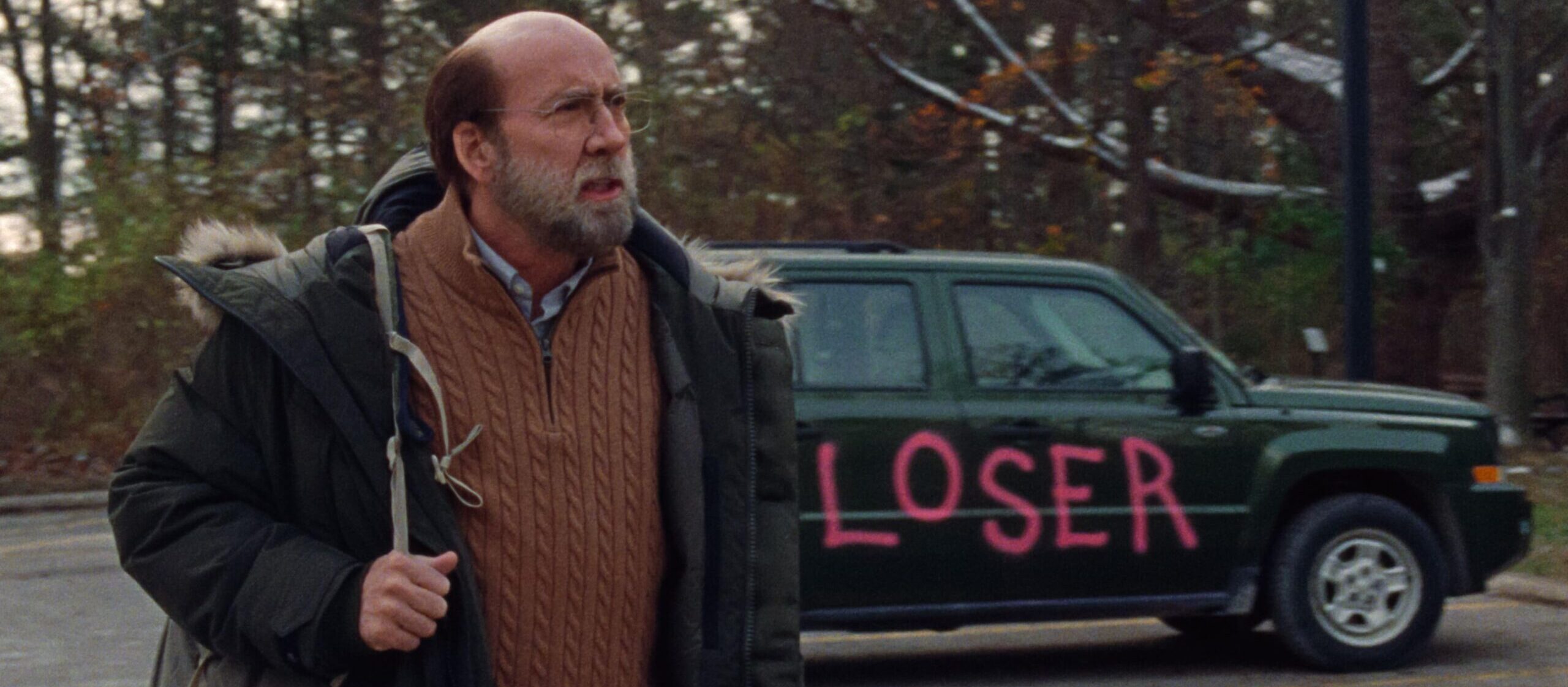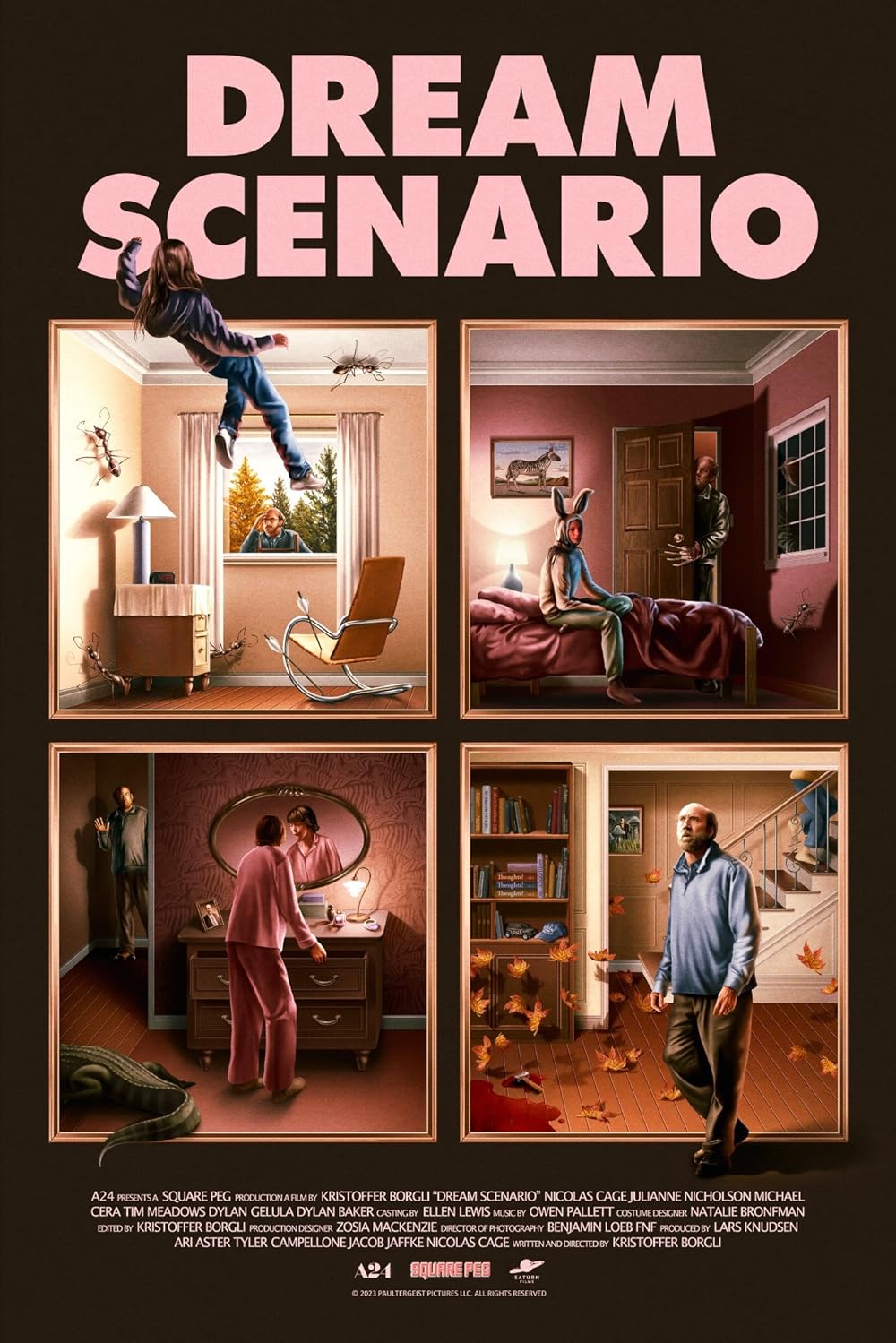

“Who has a huge penis? Me or the horse?”
Dream Scenario, from Norwegian filmmaker Kristoffer Borgli, offers a nifty high concept premise and so-so execution that are both elevated by the central performance and mere presence of the never-boring, living meme Nicolas Cage.
An insecure, anonymous, middle-aged professor who specializes in evolutionary biology and really loves ants—not plants, ants!—Paul Matthews (Cage) suddenly becomes the most famous person in the world when he begins appearing in everyone’s dreams. While his wife (Julianne Nicholson) and kids (Lily Bird, Jessica Clement) are skeptical of his newfound celebrity—this is lame old dad we’re talking about here—he initially enjoys the attention and validation, but is irked that he is apparently as passive in the dreamworld as he is in real life. No matter what the dreamer is experiencing—eating abnormally large mushrooms while running from bloody demons, cowering while crocodiles circle—Paul is merely watching. Except in the dreams of Molly (Dylan Gelula), a frisky employee of a marketing firm (run by Michael Cera and Kate Berlant) that wants to exploit the phenomenon to sell soda and whatnot. She fantasizes Paul as an aggressive sexual partner. And so our protagonist shortcuts the personal growth we expect and is given what he wants without working for it, commencing a warped, inverted version of the hero’s journey.
His failed, shameful tryst with the younger woman and the publication of a former colleague’s research in his area of expertise (“antelligence”) pushes him over the edge. Though he remains an agitated, pitiful coward in the waking world, in the collective dreamscape he becomes a menace; a night stalker, a sexual predator, a serial killer. It’s a parody of Cage’s freakshow style, with the bewildered Paul reflecting the actor’s own displeasure with the popular perception of his heavily affected performance style. Borgli emphasizes the surreality of the situation with horrific flash frames of the predatory dream-vision Paul spliced into mundane dinner conversations, and several segments only blurrily distinguish our frame of reference. Thus shunned in circles where he was briefly popular, each attempt to make amends only exacerbates the issue, until he is ostracized from society, given indefinite leave by the university dean (Tim Meadows), and divorced from his wife. Neither pre-fame nor post-fame was Paul’s bubble of isolation of his own making, and the fact that life isn’t fair absolutely devastates him. In his darkest hours, he has a dream of his own, in which he is stalked by his doppelgänger and pierced by arrows. An ephemeral salve comes when he dreams of his wife’s fantasy (or maybe he’s visiting her dream): Paul saving her from danger dressed in David Byrne’s oversized suit from Stop Making Sense.
Whether the film is mocking the professor, his elitist colleagues, his trigger-happy students, or meme culture in general is never quite clear. It finishes up with an ill-fitting final act in which a tech bro invents a technology that allows salesmen to infiltrate people’s dreams, severely undercutting the entrancing buildup and revealing that Borgli (who also wrote the screenplay) wasn’t quite sure how to flesh his premise out to a feature length film.
Flirting with issues of viral fame, cancel culture, safe spaces, influencers, instant gratification, and mimetic desire, this distant cousin of Spike Jonze and Charlie Kaufman’s Being John Malkovich and Adaptation (which also stars Cage) is, in terms of moral, a firm, fantastical reminder that our perception of ourselves and the world around us shapes how we act and who we become. Unlike the works of Charlie Kaufman, however, and mostly because of that awkward denouement, it’s not a multivalent creative work with emergent themes that the viewer enjoys mulling over in the days after seeing it, but a fairly on-the-nose exploration of the modern culture war that concludes, like Darren Aronofsky’s The Whale, with its protagonist atoning for his sins by floating into the void. Cage’s self-reflexive era has been an interesting and mildly refreshing little cottage industry, with Mandy, The Unbearable Weight of Massive Talent, Pig, and now Dream Scenario being intricately bound up in the actor’s longstanding public persona as a wild leading man and outshining even the best of the genre fare that he continues to pump out (Joe, Prisoners of Ghostland, Renfield).